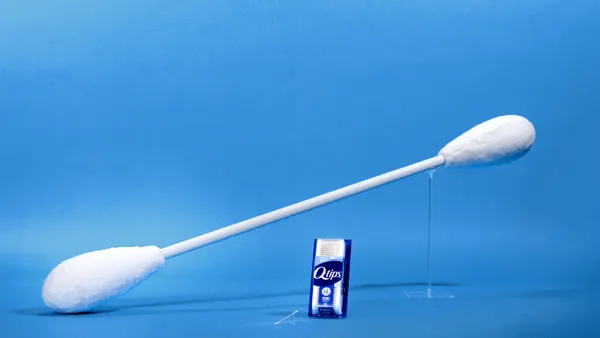Dive Brief:
- AnalyticsIQ identified four pandemic personas — on guard cynics, careful optimists, remiss pessimists and lax dreamers — in a new report, "Pandemic Personas," shared with Marketing Dive that aims to help marketers understand consumer psychology in the current moment.
- Twenty-eight percent of consumers are on guard cynics, which have a protective and negative attitude. This group includes people ages 25-64, but 18-24 year olds are twice as likely to have a cynical outlook. Seventy-five percent of these consumers are democrats. Twenty-three percent of consumers are careful optimists, who adopt protective behaviors but remain positive. Eighty-eight percent of this group is above the age of 45 and this persona skews female.
- Thirty percent of consumers are considered lax dreamers. These people have a bright outlook and remain positive without practicing protective behaviors. The majority of this group are married men, with 82% of this audience aged 45 or older. Consumers living in small rural towns or farming communities are twice as likely to be considered lax dreamers. Nineteen percent of consumers are remiss pessimists, a group with a negative outlook about the pandemic that does not participate in protective behaviors. This group is made up of mostly single men aged 25-64 who are high earners and tend to live in urban or suburban areas.
Dive Insight:
Marketing during a time of crisis is not easy, and as brands look to navigate the complex environment, it helps to have a clear understanding of who they are talking to. AnalyticsIQ developed these personas to help advertisers understand how core demographics might be feeling about the pandemic so that they can adjust their messaging accordingly.
For instance, a careful optimist is prioritizing purchasing masks, gloves and herbal products, whereas on guard cynics are spending on soap and sanitizer, OTC medication and masks. Politically independent remiss pessimists, on the other hand, are opening their wallets for alcohol, DIY projects and apparel. Lax dreamers are spending on household cleaners, groceries and medications, with these conservative consumers behaving as though it is business as usual.
The research also highlights how the different personas are coping during the health crisis. Careful optimists are journaling, meditating and calling family; on guard cynics — who are more likely to include non-medicinal techniques in their health and wellness routine — are drinking alcohol, playing music and cleaning; lax dreamers are praying as well as listening to and playing music, while remiss pessimists are drinking alcohol, eating and cleaning.
What constitutes a good message during the crisis has been an evolving story. In the first weeks of the health crisis, brands that focused on how they were supporting their employees and communities earned high empowerment metrics according to Ace Metrix, with Ford and Guinness ranking high on its list of early standouts. As time has worn on, consumers are still open to COVID-19 messaging, with Verizon's Pay It Forward earning the mark as the most empowering ad with COVID-19 messaging in April.
But in time, consumers started to grow fatigued with coronavirus-related ads. By May, a sense of sameness and exploitation had set in, Ace Metrix found. At this point, ads related to the pandemic had a harder time breaking through.
As the pandemic wears on, so too does the need for more nuanced messaging. Pinpointing different pandemic personas can help brands identify where their customers fit and create more relevant messages.











